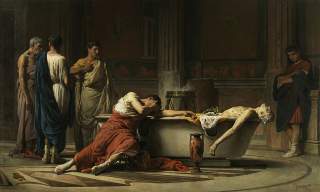The Iron Lady's Centurions
There are memoirs that pose as histories and histories that pose as memoirs. Peter Stothard’s imaginative The Senecans is a bit of both and a little of neither.
There is a subtle textual and sexual variance. The gay hero, an outsider at the court of “the Lady,” catches a dance with her that causes rage among those whose claim is greater but whose opportunism is less. It is one of the finest novels of our time for imitating its world.
There are moments when, halfway through some of the almost too finely crafted monologues and exchanges in The Senecans, one feels as if one is reading just such a novel. In the end, it is all a little too perfectly planned, fitted and polished to make for a convincing memoir. But it is also clever, insightful and highly entertaining reading once you recognize it for what it is.
There is also something a little touching and sustaining in the picture of Stothard and his four fellow Senecans, busy, ambitious men of the world all, gathered around a wobbly table sipping drinks—in Frank Johnson’s case a soft drink; he never trusted himself much with alcohol—and trying to extract a bit of wisdom and reason from the ancient past in the midst of their daily scramble on or around the greasy pole of contemporary politics. In my years in the Nixon, Ford and Reagan White Houses, and in my extensive and sometimes enjoyable socializing with American journalists and assorted political types over many decades, I’ve met many interesting, informed, articulate individuals—not to mention even more uninteresting, uninformed, inarticulate individuals—but I can’t think of any of them who would have been able to hold up their end of a conversation about Seneca at the Old Rose Pub.
Nevertheless, even though I enjoyed almost everything about The Senecans, if I were asked for the title of one book that could convey the impact of Mrs. Thatcher on her time—and clearly depict the behind-the-scenes parliamentary intrigues directed against her even in her salad days—it would have to be a much more conventional nonfiction work by a man who probably understood and appreciated Mrs. Thatcher far better than any of the Senecans, with the possible exception of Ronnie Millar. That book is Mrs. Thatcher’s Minister: The Private Diaries of Alan Clark. The son of Lord Kenneth Clark of Civilization fame, the late Alan Clark was a brilliant, not particularly self-disciplined Tory politician who loved life but also served his country and his prime minister well. His largeness of spirit, bonhomie and erudition—not to mention his appetite for the good life at table and in bed—shine through along with his basic decency as a public man. More than anything written by any of the Senecans, Alan Clark’s diary will be a source of illumination for future historians. It will also be a delight to the intelligent general reader, as entertaining and instructive as the Duke of Saint-Simon’s malicious sketches of life at Versailles, or Lord Hervey’s waspish memoirs of the ridiculous court and parliamentary goings-on under the irascible, German-accented King George II and his considerably more clever but tragicomic consort, Queen Caroline. Clark simply wrote with an ease and grace that was natural to him rather than acquired through study. He ended his published diary with the February 1991 entry describing his swearing in—by the Queen—as a member of the Privy Council, an empty but ornamental honor rewarding a long and modestly successful parliamentary and ministerial career. Clark’s closing words convey an ability to laugh at himself that none of the Senecans seem to have possessed:
The last phase [of the ceremonial gathering] was somewhat drawn out. Not for the first time I wondered about the Queen. Is she really rather dull and stupid? Or is she thinking “How do people as dull and stupid as this ever get to be Ministers?” Or is, for her, the whole thing so stale and deja vu after forty years that she’d really rather be going round the stables at Highclere, patting racehorses on the nose? I suppose it might feel different if she had real power. And yet she does have the power. It’s all there in the Constitution, all she has to do is renounce the Civil List for her ill-favored siblings, pay taxes on her private wealth, and get on with it.
I drove back to the House [of Commons], and had a boring, overcooked lunch in the Members’ dining room.
By contrast, although it occurs ten pages before Stothard’s closing soliloquy, it is the clever, astringent Miss R who gets in the real last word in The Senecans. At the end of their final interview, she rounds on her condescending host and declares:
You have spent most of your life just looking, not doing. Lucky for you, I think, now that I know a bit more about where you’ve been. I’ve learned a lot from the Senecans but I don’t want a new breed of them. Do you?
Whether or not one wants to see the breed continue, it’s hard to imagine it escaping extinction for much longer. If I manage to outlive it, I for one will miss it.
Aram Bakshian Jr. served as an aide to Presidents Nixon, Ford and Reagan and has written extensively on politics, history, gastronomy and the arts for American and overseas publications.
Image: The Death of Seneca, Manuel Domínguez Sánchez. Wikimedia Commons/Public domain

